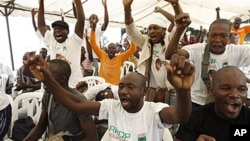The United Nations is warning supporters of incumbent Ivorian president, Laurent Gbagbo, that a planned attack on the headquarters of internationally-endorsed election winner, Alassane Ouattara, could spark widespread violence. Mr. Ouattara is calling for a peaceful resolution to the violent, month-long political standoff.
Ivory Coast remains locked in a political power struggle between incumbent president, Laurent Gbagbo, and challenger Alassane Ouattara, who the United Nations and much of the international community recognized as the winner of last month's poll.
The November 28 presidential election was meant to reunite the country following a 2002-2003 civil war. Instead, the United Nations says post-electoral violence has killed more than 170 people.
What should have been a celebration, Mr. Ouattara says, has instead become a period of mourning.
Speaking Thursday, Mr. Ouattara says he regrets the lost time and is impatient to start implementing initiatives aimed at improving living conditions for women and villagers and creating jobs for young people. But, he says, the thing I swore to do is to spare the maximum number of human lives. He says that it why I am being patient.
So far, Mr. Gbagbo has refused to budge in the face of international sanctions, blocked funds, mounting diplomatic pressure and threats of regional military intervention.
On Thursday, U.N. Secretary-General, Ban Ki-Moon, condemned calls from militant Gbagbo youth leader, Charles Ble-Goude, for an attack Saturday on the Abidjan hotel where Mr. Ouattara has set up his rival government under the protection of U.N. peacekeepers.
The U.N. chief said any attack on the hotel was, in his words, "dangerous" and "irresponsible" and could re-ignite civil war. He said U.N. forces are authorized to use all necessary means to protect its personnel, government officials and other civilians at the hotel.
Like Mr. Gbagbo, Ble-Goude accuses foreigners of threatening Ivory Coast's sovereignty. He has urged supporters to fight to the death to keep Mr. Gbagbo in power.
The United Nations has condemned attempts by Mr. Gbagbo's camp to incite attacks on its 10,000-member peacekeeping force, which it has refused to withdraw despite Mr. Gbagbo's demands.
Human rights groups accuse pro-Gbagbo security forces of abducting and torturing political opponents. U.N. human rights officials called Thursday for investigators to be allowed to examine a reported mass burial site in Abidjan, where they believe there are as many as 80 bodies. They have so far been blocked by security forces.
Mr. Ouattara's newly appointed Ivory Coast ambassador to the United Nations, Youssoufou Bamba, warns that Ivory Coast is on the brink of genocide. U.N. advisers said allegations that homes of Mr. Gbagbo opponents had been marked to identify their ethnicity were extremely worrying but did not use the term genocide.
Mr. Gbagbo's government continues to deny the existence of mass graves and allegations of human rights abuses.
An ECOWAS delegation is expected to return to Abidjan Monday for continued negotiations. Three West African leaders met with Mr. Gbagbo Tuesday to deliver an ECOWAS ultimatum that Mr. Gbagbo could leave peacefully or be removed by force.
The pro-Ouattara former rebel force to the North, the New Forces, says it will fight alongside ECOWAS should the West African regional bloc undertake a military intervention.
ECOWAS head and Nigerian president, Goodluck Jonathan, said a decision would be made after the talks but he is hoping for a peaceful resolution.




